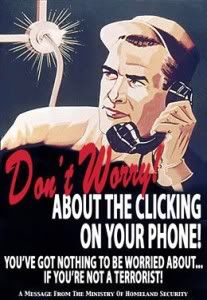Don't worry about that clicking on your phone

Amidst the inevitable 9-11 retrospectives, I feel like only the Los Angeles Times is putting the past ten years in the proper perspective. Because the longest-lasting legacy of the 9-11 attacks is clearly the terror industry it spawned. Over the weekend the LAT looked at the hundreds of billions of dollars being spent on absurd “security” projects, filling the pockets of contractors, and for little benefit:
“The number of people worldwide who are killed by Muslim-type terrorists, Al Qaeda wannabes, is maybe a few hundred outside of war zones. It’s basically the same number of people who die drowning in the bathtub each year,” said John Mueller, an Ohio State University professor who has written extensively about the balance between threat and expenditures in fighting terrorism.
Today’s entry from the LAT is even better, and something I feel we pay too little attention to. In the decade since 9-11, this has become a surveillance state, and the government collects enormous amounts of data on every man, woman and child in America, in all likelihood too much to process. We all know about this, but it’s important to see all that surveillance together in one package:
…the secret domestic intelligence gathering [...] is one of the most significant legacies of Sept. 11. U.S. law enforcement and intelligence agencies now collect, store and analyze vast quantities of digital data produced by law-abiding Americans. The data mining receives limited congressional oversight, rare judicial review and almost no public scrutiny.
Thanks to new laws and technologies, authorities track and eavesdrop on Americans as they never could before, hauling in billions of bank records, travel receipts and other information. In several cases, they have wiretapped conversations between lawyers and defendants, challenging the legal principle that attorney-client communication is inviolate.
We had one moment where this was subject to any debate at all, during the fight over the FISA amnesty legislation. But that was really about a small portion of the total data collection. Most of the surveillance remains a secret. Ron Wyden and Mark Udall tried to tease out a little more this summer, when they tried to get the intelligence community to admit to how they were misinterpreting the Patriot Act to allow for more data collection. But that never went anywhere. From NSA surveillance to national security letters to the AT&T room on Folsom Street in San Francisco, what bits and pieces we do know about point to a giant network Hoovering up every piece of information you let out into the world digitally.
I appreciate the LA Times highlighting this legacy. Nobody really questions why we’ve deprived American civil liberties to this degree, to protect the homeland from a threat that mirrors the threat posed by full bathtubs. Read the whole story for yourself. This has been an inexorable slide downward for ten years, and it shows no sign whatsoever of letting up.
i've said repeatedly for years, anyone who uses any digital network, no matter what it is, from swiping a supermarket discount card to making an atm withdrawal to using email to making a credit card purchase, can safely assume that all those transactions are being swept up in the national surveillance dragnet to be sniffed and ultimately filed for possible later use... anybody who thinks otherwise is simply living in a dream world...
Labels: ATT, domestic surveillance, Firedoglake, FISA, LA Times, NSA, Patriot Act, surveillance society, warrantless domestic wiretapping
Submit To PropellerTweet














